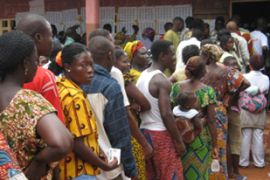Good turnout in Togo elections
Voters choose between more than 2,000 candidates from 31 political parties.

| Togo timeline | ||
Togo, officially called the Togolese Republic, is located on Africa’s west coast, bordering Ghana in the west, Benin in the east, and Burkina Faso in the north. Its population is about 6.1 million. 1960: Togo gains independence under Sylvanus Olympio, the first president. 1963: Olympio is assassinated in a military coup by a group of soliders under the directions of Sergeant Etienne Eyadema Gnassingbe. 1967: Gnassingbe launched a bloodless coup and appointed himself as president. 1991: Political parties were legalised. 1992: A democratic constitution was adopted. 1998: A joint investigation by the UN and the Organisation of African Unity (OAU) concluded that elections this year resulted in ‘systematic human rights violations’. 2005: Gnassingbe dies after 38 years in power. He was Africa’s longest serving ruler. Faure Gnassingbe, his son, is appointed as president, provoking international condemnation. According to the UN, at least 500 people were killed in violence during polls held two months later. As many as 40,000 people fled to neighbouring countries. |
“We came out today because this seems to be more serious than in the past,” said Djato Awussi, 33, as she cast her ballot.
Voters were asked to choose between more than 2,000 candidates from 31 political parties.
All the main political parties are represented, including the Union of Forces for Change (UFC), which has boycotted previous polls.
Togolese authorities hope Sunday’s polls will lead to a full resumption of international aid to their country, which has suffered periods of bloody unrest since independence in 1960.
The EU, once Togo’s biggest donor, froze most aid to the country in 1993, citing the poor democratic record of then president Gnassingbe Eyadema, who ruled Togo for four decades.
Campaign message
The RPT has based its campaign message on what Faure Gnassingbe, Togo’s president, and son of the previous leader, has achieved in the past two years with regard to improving relations between the ruling party and the opposition.
Gnassingbe was first put into power by the military in April 2005 after the death of his father Gnassingbe Eyadema, but he stood down shortly afterwards amid public dissastisfaction with the military.
Two months later he won an election that was boycotted by the political opposition, but his government has since managed to break a long-standing political deadlock.
